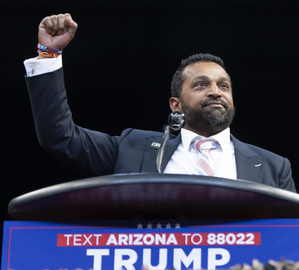Indian-American Kash Patel’s rise from public defender to FBI Director
BILKULONLINE
SUNDAY Special
Washington, Dec 1 : Indian-American Pentagon official Kashyap ‘Kash’ Patel will head the Federal Bureau of Investigation (FBI) under the administration of US President-elect Donald Trump.
Patel, a loyal supporter of Trump, has actively advocated for dismantling what he describes as the “deep state” within the US government. Born in 1980 in Queens, New York, to Gujarati immigrant parents from East Africa, Patel earned a law degree and began his career as a public defender in Florida, representing clients in state and federal courts.
He later joined the Department of Justice as a prosecutor, specialising in international terrorism cases in East Africa and the United States. His tenure at the Department of Defense as a civilian lawyer saw him focus on global counterterrorism operations, ultimately catching the attention of Congressman Devin Nunes. Nunes recruited Patel as senior counsel on counterterrorism during his time as Chair of the House Intelligence Committee. Kash Patel gained prominence during Donald Trump’s first term and was involved in the House Republicans’ investigation into the FBI’s handling of the Russia probe.
He played a crucial role in drafting a controversial GOP memo that alleged bias in the FBI’s investigation of Trump’s 2016 presidential campaign. This document, referred to as the “Kash Memo” by the American media, became a significant point of contention in the partisan conflict surrounding the Russia investigation. Patel, 44, continued to influence Trump’s national security policies as the Chief of Staff to the Acting Secretary of Defense.
During this time, he was also accused of acting as an unauthorised backchannel for Ukraine. He has openly expressed his desire to reform the FBI. In an interview on the conservative Shawn Ryan Show, Patel suggested significant changes, including dismantling the FBI’s intelligence-gathering operations and repurposing its headquarters. “The biggest problem the FBI has had has come out of its intel shops. I’d break that component out of it. I’d shut down the FBI Hoover building on day one and reopen it the next day as a museum of the deep state,” Patel had said.
“And I’d take the 7,000 employees that work in that building and send them across America to chase down criminals. Go be cops. You’re cops. Go be cops,” he added. Patel would work under Trump’s proposed Attorney General, Pam Bondi, to restore what the President-elect described as the FBI’s original principles — Fidelity, Bravery, and Integrity. Patel’s nomination reflects Trump’s dissatisfaction with current FBI Director Christopher Wray, whom he criticised for the bureau’s investigations into Trump, including the search of Mar-a-Lago for classified documents. The appointment also signals Trump’s commitment to reshaping federal law enforcement and strengthening his administration’s ties with the Indian-American community, a group that has steadily gained political influence in the United States.
Trump announced Patel’s nomination on his social media, Truth Social, praising his achievements and dedication to the “America First” agenda. Trump emphasised Patel’s role in exposing what he called the “Russia Hoax” and highlighted his extensive legal experience, including over 60 jury trials. If confirmed by the Senate, Patel would become the first Indian-American and South Asian to lead the FBI, marking a significant milestone for the Indian-American community. Patel’s nomination represents a significant advancement for the Indian-American community, which has gradually and consistently increased its influence in the political landscape of the United States in line with its growing financial power. Patel’s nomination marks a new milestone for the community under Trump’s leadership. The President-elect previously appointed Nikki Haley, an Indian American Republican, as the ambassador to the United Nations during his first administration.
This federal cabinet-level position made Haley the highest-ranking Indian American in the US political system until Kamala Harris was elected Vice President in 2020 as part of President Joe Biden’s ticket.



